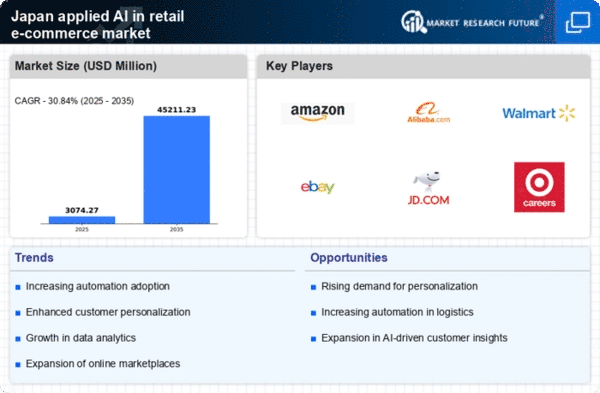Expansion of Mobile Commerce
The expansion of mobile commerce is a significant driver for the applied ai-in-retail-e-commerce market in Japan. With the proliferation of smartphones, consumers are increasingly turning to mobile platforms for their shopping needs. Recent data suggests that mobile commerce sales in Japan are projected to reach ¥4 trillion by 2025, accounting for over 30% of total e-commerce sales. Retailers are responding by optimizing their mobile interfaces and integrating AI technologies to enhance user experience. This shift towards mobile commerce is likely to create new opportunities for businesses within the applied ai-in-retail-e-commerce market, as they adapt to changing consumer preferences.
Integration of Advanced Analytics
The integration of advanced analytics within the applied ai-in-retail-e-commerce market is becoming increasingly vital for businesses in Japan. Companies are leveraging AI-driven analytics to gain insights into consumer behavior, preferences, and purchasing patterns. This data-driven approach allows retailers to optimize inventory management and enhance supply chain efficiency. According to recent statistics, approximately 70% of retailers in Japan are expected to adopt advanced analytics solutions by 2026. This trend indicates a growing recognition of the importance of data in driving strategic decisions. As a result, businesses that effectively utilize analytics are likely to gain a competitive edge, thereby propelling growth in the applied ai-in-retail-e-commerce market.
Enhancement of Customer Experience
Enhancing customer experience is a primary driver in the applied ai-in-retail-e-commerce market. Retailers in Japan are increasingly utilizing AI technologies to create personalized shopping experiences. This includes tailored product recommendations and dynamic pricing strategies that respond to real-time market conditions. A recent survey indicates that 65% of consumers in Japan prefer shopping with retailers that offer personalized experiences. Consequently, businesses that prioritize customer experience through AI are likely to see increased customer loyalty and higher conversion rates. This focus on customer satisfaction is expected to significantly influence the growth trajectory of the applied ai-in-retail-e-commerce market.
Focus on Sustainability Initiatives
The focus on sustainability initiatives is becoming a prominent driver in the applied ai-in-retail-e-commerce market. Japanese consumers are increasingly prioritizing eco-friendly products and practices, prompting retailers to adopt sustainable strategies. AI technologies are being utilized to optimize resource usage and reduce waste in retail operations. For instance, AI can help in predicting demand more accurately, leading to less overproduction and waste. A survey indicates that 55% of consumers in Japan are willing to pay a premium for sustainable products. This shift towards sustainability is likely to influence purchasing decisions, thereby impacting the growth of the applied ai-in-retail-e-commerce market.
Adoption of AI-Powered Supply Chain Solutions
The adoption of AI-powered supply chain solutions is emerging as a crucial driver in the applied ai-in-retail-e-commerce market. Japanese retailers are increasingly implementing AI technologies to streamline logistics and improve demand forecasting. By utilizing machine learning algorithms, businesses can predict inventory needs more accurately, reducing excess stock and minimizing costs. Reports indicate that companies employing AI in their supply chain operations can achieve cost reductions of up to 20%. This efficiency not only enhances profitability but also contributes to a more responsive retail environment, thereby fostering growth in the applied ai-in-retail-e-commerce market.
















